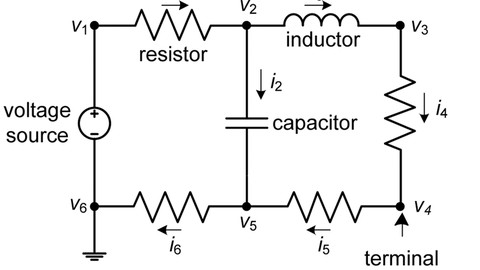
Electric Circuits
Electric Circuits, available at $49.99, has an average rating of 3.9, with 16 lectures, based on 23 reviews, and has 1192 subscribers.
You will learn about Basic Concepts: System of units (SI units), Charge & Current, Voltage Power & Energy, Circuit Elements. Basic Laws: Ohm's Law, Nodes & Branches and Loops, Kirchhoff's Laws, Series Resistors And Voltage Division, Parallel Resistors And Current Division, Wye-Delta Transformation. Methods Of Analysis(ADVANCED ANALYSIS): Nodal Analysis, Mesh Analysis, Super Nodes & Super Mesh. Circuit Theorems: Superposition, Source transformation, Thevenin's Theorem, Norton's Theorem, Maximum Power Transfer. Capacitors, Series And Parallel Capacitors. Inductors, Series And Parallel Inductors. Complex Numbers. Sinusoids And Phasors and How to convert from Time Domain To phasor Domain. Impedance For Capacitors And Inductors. This course is ideal for individuals who are Any one who interested in electric circuits. or Or an electrical engineer who wants to enhance his skills. It is particularly useful for Any one who interested in electric circuits. or Or an electrical engineer who wants to enhance his skills.
Enroll now: Electric Circuits
Summary
Title: Electric Circuits
Price: $49.99
Average Rating: 3.9
Number of Lectures: 16
Number of Published Lectures: 16
Number of Curriculum Items: 16
Number of Published Curriculum Objects: 16
Original Price: $89.99
Quality Status: approved
Status: Live
What You Will Learn
- Basic Concepts: System of units (SI units), Charge & Current, Voltage Power & Energy, Circuit Elements.
- Basic Laws: Ohm's Law, Nodes & Branches and Loops, Kirchhoff's Laws, Series Resistors And Voltage Division, Parallel Resistors And Current Division, Wye-Delta Transformation.
- Methods Of Analysis(ADVANCED ANALYSIS): Nodal Analysis, Mesh Analysis, Super Nodes & Super Mesh.
- Circuit Theorems: Superposition, Source transformation, Thevenin's Theorem, Norton's Theorem, Maximum Power Transfer.
- Capacitors, Series And Parallel Capacitors.
- Inductors, Series And Parallel Inductors.
- Complex Numbers.
- Sinusoids And Phasors and How to convert from Time Domain To phasor Domain.
- Impedance For Capacitors And Inductors.
Who Should Attend
- Any one who interested in electric circuits.
- Or an electrical engineer who wants to enhance his skills.
Target Audiences
- Any one who interested in electric circuits.
- Or an electrical engineer who wants to enhance his skills.
Learn electric circuits and circuit analysis from ground up to advanced level
In this course you will learn:
-System of units(SI).
-Charge and current.
-Voltage.
-Power and energy.
-Circuit elements.
-passive and active elements.
-Ohm’s law.
-Nodes and branches and loops.
-Kirchhoff’s laws(KVL,KCL).
-Series resistors & voltage division.
-Parallel resistors & current division.
-Wye to Delta & Delta to Wye conversion.
-Nodal analysis & Super node.
-Mesh analysis & Super mesh.
-Superposition.
-Source transformation.
-Thevenin’s theorem.
-Norton’s theorem.
-Maximum power transfer.
-Capacitors.
-Series and parallel capacitors.
-Inductors.
-Series and parallel inductors.
-Complex numbers.
-Sinusoids & phasors.
-Converting from time domain to phasor domain.
-Impedance for capacitors & Inductors.
Course Curriculum
Chapter 1: Basic Concepts
Lecture 1: Introduction: SI units, Charges, Current, Voltage + Energy & Power.
Lecture 2: Passive and active elements And their calculations.
Lecture 3: Dependent and Independent Sources.
Chapter 2: Basic Laws
Lecture 1: Ohm's Law, Circuit Topology & KCL(PART 1).
Lecture 2: KCL(PART 2) & KVL(PART 1) + Applications On KVL And KCL.
Lecture 3: KVL(PART2), Resistors In Series & Parallel + Current Division & voltage Division
Lecture 4: Solving More Problems.
Lecture 5: Delta-Wye & Wye- Delta Conversion.
Chapter 3: CHAPTER 3: Methods Of Analysis.
Lecture 1: Nodal Analysis
Lecture 2: Super Node
Lecture 3: Mesh Analysis & Super Mesh
Chapter 4: Circuit Theorems
Lecture 1: Superposition & Source Transformation Part 1
Lecture 2: Source Transformation Part 2
Lecture 3: Thevenin's Theorem & Norton's Theorem
Lecture 4: Maximum Power Transfer
Chapter 5: Capacitors, Inductors And Steady State Analysis.
Lecture 1: Steady State Analysis
Instructors
-
Ibrahim muakkit
I'm an Electrical Engineer & a Programmer, Jordan University
Rating Distribution
- 1 stars: 2 votes
- 2 stars: 0 votes
- 3 stars: 2 votes
- 4 stars: 3 votes
- 5 stars: 16 votes
Frequently Asked Questions
How long do I have access to the course materials?
You can view and review the lecture materials indefinitely, like an on-demand channel.
Can I take my courses with me wherever I go?
Definitely! If you have an internet connection, courses on Udemy are available on any device at any time. If you don’t have an internet connection, some instructors also let their students download course lectures. That’s up to the instructor though, so make sure you get on their good side!
You may also like
- Best Video Editing Courses to Learn in March 2025
- Best Music Production Courses to Learn in March 2025
- Best Animation Courses to Learn in March 2025
- Best Digital Illustration Courses to Learn in March 2025
- Best Renewable Energy Courses to Learn in March 2025
- Best Sustainable Living Courses to Learn in March 2025
- Best Ethical AI Courses to Learn in March 2025
- Best Cybersecurity Fundamentals Courses to Learn in March 2025
- Best Smart Home Technology Courses to Learn in March 2025
- Best Holistic Health Courses to Learn in March 2025
- Best Nutrition And Diet Planning Courses to Learn in March 2025
- Best Yoga Instruction Courses to Learn in March 2025
- Best Stress Management Courses to Learn in March 2025
- Best Mindfulness Meditation Courses to Learn in March 2025
- Best Life Coaching Courses to Learn in March 2025
- Best Career Development Courses to Learn in March 2025
- Best Relationship Building Courses to Learn in March 2025
- Best Parenting Skills Courses to Learn in March 2025
- Best Home Improvement Courses to Learn in March 2025
- Best Gardening Courses to Learn in March 2025






















